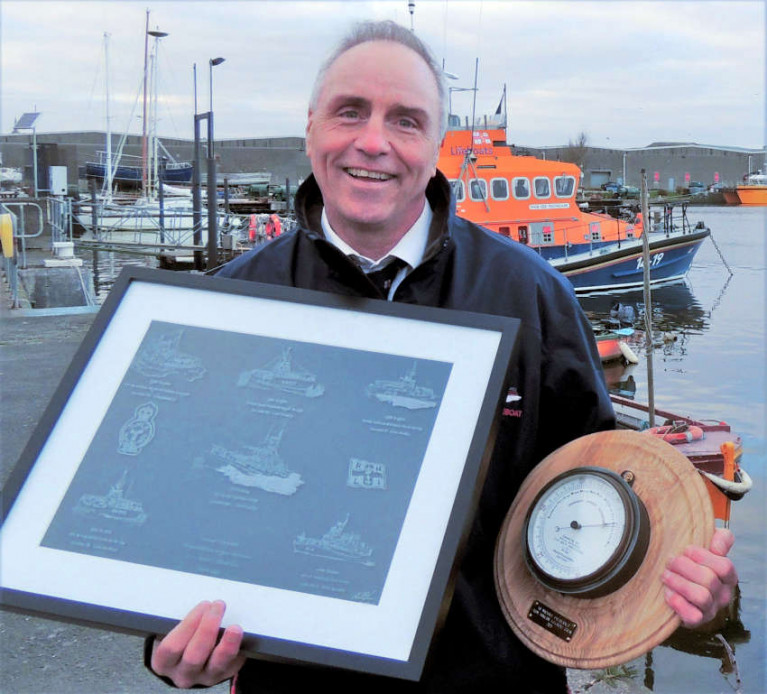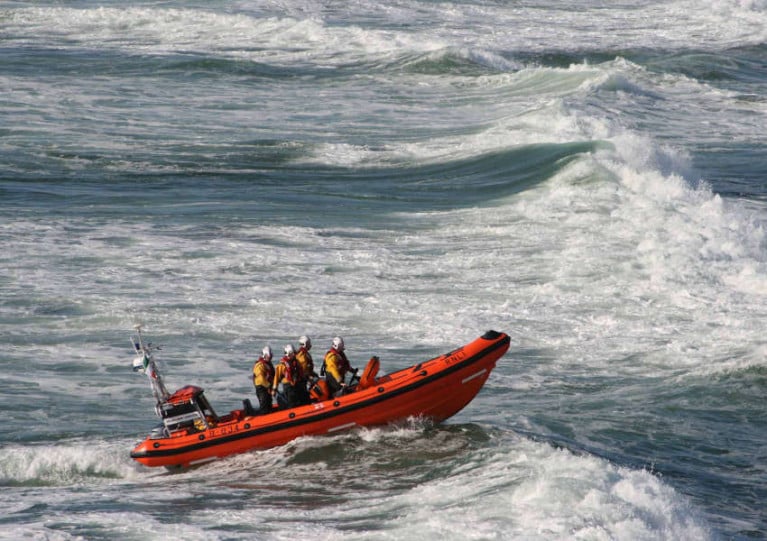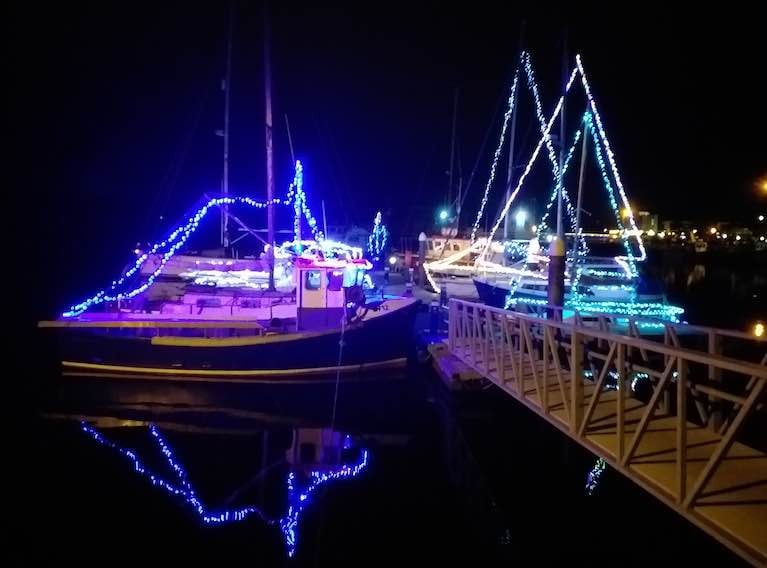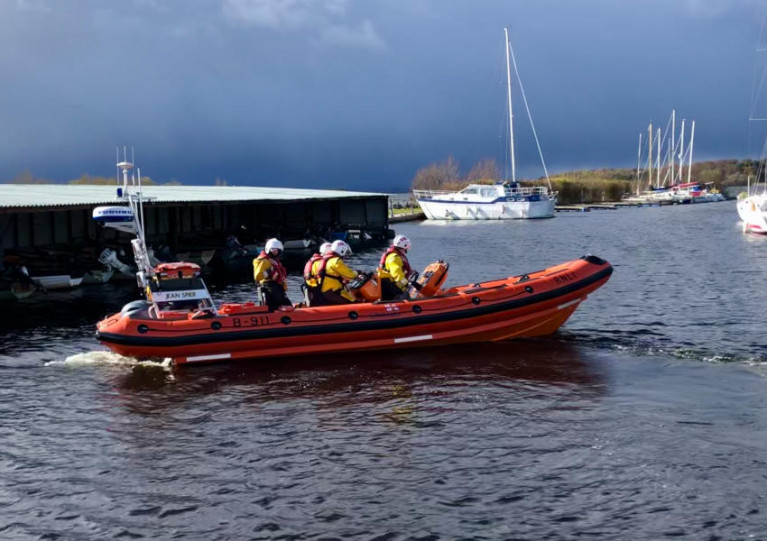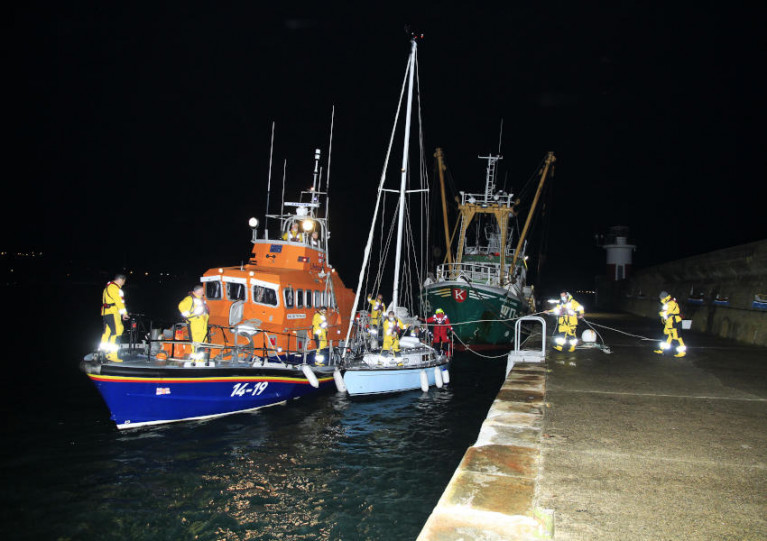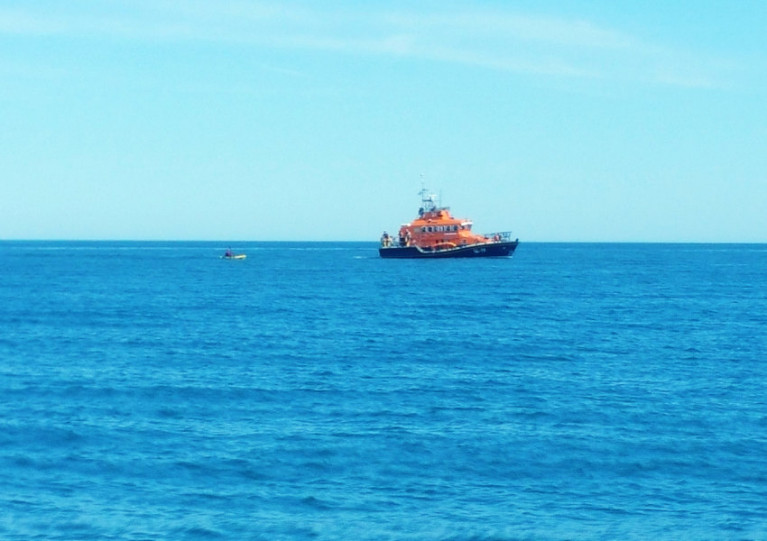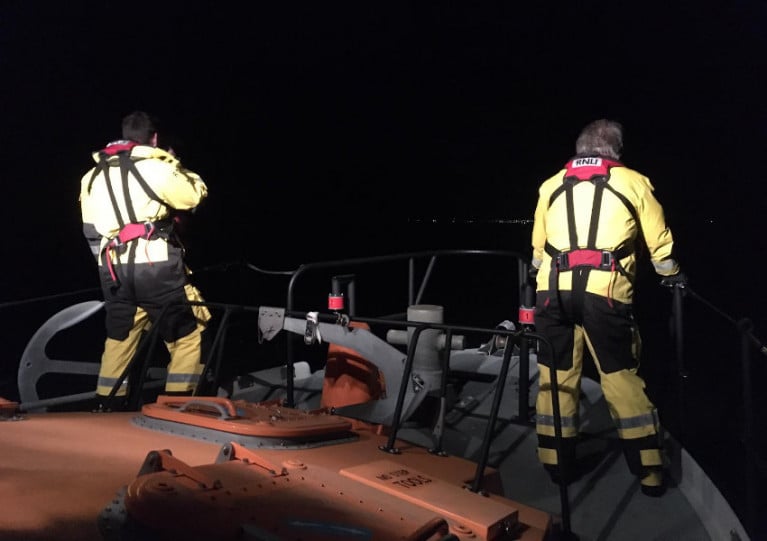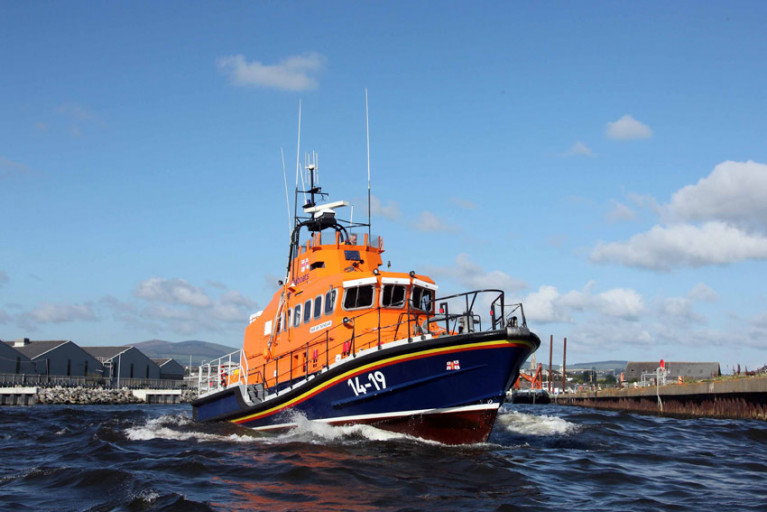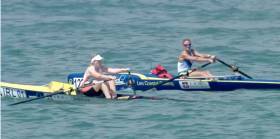Displaying items by tag: Arklow
Arklow RNLI marked the end of an era last Friday 5 March when Michael Fitzgerald, the station’s full-time mechanic retired after 40 years of dedicated service to the charity.
Michael, who grew up on Harbour Road in Arklow, first joined the RNLI in 1980 when he was just 16. At the time, the station had a wooden lifeboat.
It was his uncle, also Michael, a second mechanic on the crew, who inspired the then young Michael with a love for all things lifeboating.
While not eligible to officially join the crew until he was 17, Michael’s early passion shone through and to his delight, his name was registered a year early when the late coxswain Michael O’Brien made a plea on his behalf during a station inspection.
A former electrician, Michael volunteered for 19 years before being appointed Arklow RNLI’s full-time station mechanic, a position he held for the last 21 years.
His role involved a wide range of duties and evolved with time, with Michael serving on and maintaining six different classes of lifeboat including the station’s current all-weather Trent class lifeboat, the Ger Tigchlearr, which arrived in 1997. Michael was also a key member of the team when the call for help came and the lifeboat was put to sea.
‘A man of humility, integrity and passion, he has made a significant contribution to saving lives at sea off the Arklow coast’
Paying tribute to Michael this week, Peter Harty, RNLI area lifesaving manager, said: “Michael is the living embodiment of the RNLI’s values.
“A man of humility, integrity and passion, he has made a significant contribution to saving lives at sea off the Arklow coast for more than four decades and we are extremely grateful to him for his dedication and selfless service throughout that time.
“Thankfully, Michael will not be lost to us as he will remain on as a volunteer mechanic but we want to wish him every good health and happiness in the next chapter of his life.”
John Tyrell, Arklow RNLI lifeboat operations manager, added: “Over the course of four decades, Michael has worked tirelessly to ensure the operational effectiveness of our station here in Arklow through the operation, maintenance and repair of our lifeboat and its associated machinery and equipment.
“He always ensured everything was working to the highest standard and he did so with great passion and pride. Michael’s passion for his role extended to his ability to impart his knowledge to others.
“Over the years Michael has experienced all sorts of callouts and braved all sorts of weather and challenges at sea to help bring those in difficulty to safety.
“A humble man and a friend to all, Michael has always been at the core of our lifesaving team, working to keep our lifeboats and our crews safe and we are so thankful to him for that.”
Bundoran Lifeboat Assists in Recovery of Sunken Vessel off Killybegs
Bundoran RNLI’s volunteer lifeboat crew were requested to launch yesterday afternoon (Tuesday 22 December) to reports of a 19ft vessel that had sunk off Killybegs.
Also tasked to the scene were the Sligo-based Irish Coast Guard helicopter Rescue 118 as well as the Killybegs Coast Guard RIB, while help was sought from other vessels in the area.
On arrival, the lifeboat crew found that two people who had been on the sunken vessel had already made their way to safety and were treated by an ambulance at the Killybegs slipway.
The lifeboat then assisted the coastguard RIB in securing the vessel.
Lifeboat helm Rory O’Connor said: “Thanks to quick actions of all involved, this was another successful outcome and the two people will get to spend Christmas with their loved ones.
“It’s another example of inter-agency cooperation and we were glad to be able to assist our Irish Coast Guard colleagues.”
The incident came just two days after another inter-agency operation to rescue a man whose small boat ran aground on rocks in Ballyshannon, as previously reported on Afloat.ie.
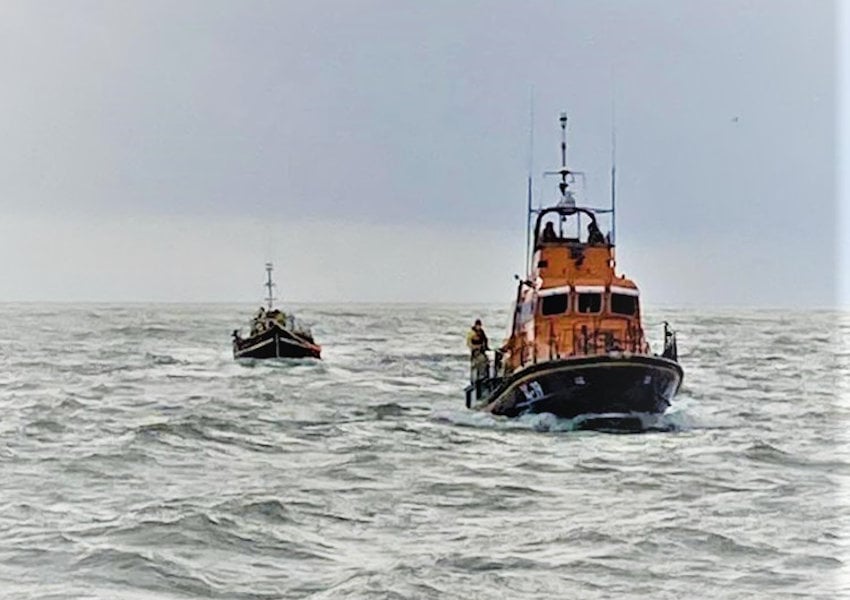 Arklow RNLI’s all-weather lifeboat Ger Tigchlearr taking a stricken fishing vessel under tow (Photo: RNLI/Arklow)
Arklow RNLI’s all-weather lifeboat Ger Tigchlearr taking a stricken fishing vessel under tow (Photo: RNLI/Arklow)
In other lifeboat news, Arklow RNLI launched to the aid of two fishermen on a vessel in distress last Thursday 17 December.
As the volunteer crew of six were en route, further reports came in that the fishing vessel had freed the foul but was adrift and dragging its anchor — and in danger of being driven up onto the rocks at Kilmichael Point.
Once on scene, the lifeboat crew worked quickly with the casualty vessel’s crew of two to establish a tow line, before the vessel was towed safely back to Arklow.
Following the incident, Arklow RNLI community safety officer Mark Corcoran gave a special shoutout to coxswain Eddie McElheron on his first callout in command of the all-weather lifeboat Ger Tigchlearr.
Boats at Arklow Harbour Get in the Christmas Spirit
Boats lit up for Christmas at Arklow Marina are certainly proving a popular draw at the County Wicklow Harbour.
In COVID-19 lockdown, boat owners have responded to the need to brighten up peoples lives by decorating their boats for the festive season.
"Several of us agreed to light up our boats and we even fitted a Christmas tree," local boater Jimmy Myler told Afloat.
The attraction is bringing lots of visitors to the harbour, Jimmy says.
Lough Derg Lifeboat Launches To Cruiser With Engine Failure
Lough Derg RNLI volunteers were tasked to the aid of two people on a cruiser which engine failure near Mountshanon Harbour yesterday afternoon, Sunday 6 September.
The inshore lifeboat Jean Spicer diverted from a training exercise just before 2pm and made way to the reported location.
With no vessel in sight, the lifeboat crew made radio contact with the stricken vessel, which it turned out had drifted close to rocks east of the Scilly Isles.
The two on board the 27ft cruiser were safe and unharmed, and wearing lifejackets.
A lifeboat crew member was put aboard and discerned that the cruiser has suffered a gearbox failure.
A tow was then set up to bring the broken down vessel back to Mountshannon Harbour, and within an hour the lifeboat had returned to Dromineer Bay to complete its exercise.
‘Even on the calmest days, inflatable toys are not fit for the conditions you will experience along our coastline’
Elsewhere on Sunday afternoon, Arklow RNLI’s all-weather lifeboat Ger Tigchlearr launched to reports of a person in difficulty in a small inflatable boat off Mizen Head.
Once the crew was on scene, the individual tried to make his way back to shore while the lifeboat stood by.
But the rocky coastline and prevailing tidal conditions made this difficult, so it was agreed the safest option was to take the person on board the lifeboat.
Following the incident, Arklow RNLI’s community safety officer Mark Corcoran said: “Thankfully this afternoon was relatively calm, had conditions been worse the situation might not have ended so well.
“In recent weeks there has been a lot of rescues all around our coastline of people from small inflatable boats and toys.
“We’d like to remind people of the real risk of drowning when you go to sea on vessels of this nature, even on the calmest days these types of boats and toys are not fit for the conditions you will experience along our coastline.”
It was a long night at sea for Arklow RNLI on Tuesday evening (4 August) as its volunteers launched to assist three people on a yacht in difficulty in the Irish Sea some 25 miles off the Co Wicklow town.
The yacht was intercepted just north of the Arklow Bank amid swells of up to five metres, and its crew were suffering from fatigue and sea sickness.
Worsening conditions meant the yacht was not able to make headway either by sail or its own engine tower, so it was taken under tow by the lifeboat to Wicklow Harbour as the safest and shortest option — eventually arriving at 1.15am, more than six hours after launch.
Lifeboat coxswain Brendan Dillon commented: “Given the prevailing conditions at sea, this could have ended very differently.”
Irish port of Arklow has beaten Wicklow to become the future operations and maintenance base for SSE Renewables' planned expansion of Ireland's first operating wind farm.
An industry source said, reports Independent.ie, that Arklow had won out chiefly because it was closer to the site than Wicklow Port, while Belfast Port was the most likely construction hub for the project, the source added.
In a joint announcement, SSE and Wicklow County Council said Arklow's south dock will be redeveloped as the base for supporting future operations of Arklow Bank. They expect 80 full-time jobs at the facility once the second phase is completed in 2025.
The existing seven-turbine farm at Arklow Bank - built in 2004 as an early test of offshore technology - currently is Ireland's only offshore wind farm and generates 25 megawatts. That is one-fortieth of one gigawatt, the goal set by the State for Ireland's offshore wind generation by 2025.
The second phase, using more powerful turbines, is designed to generate 520 megawatts using 80 to 100 turbines at the site along a swathe of the Irish Sea some 7 kilometres to 13 kilometres offshore.
However, SSE first must identify a construction hub for assembling the massive turbines. No Republic of Ireland port currently has the capacity to host these operations, which require 80-tonne cranes, reinforced quaysides and large warehouses.
An industry source said Belfast Port was most likely to be the construction hub, although a final decision will be made nearer the planned start of construction in 2023.
For further reading click the newspaper's report here.
Arklow Lifeboat Launches To Assist Kayakers
Arklow RNLI’s volunteer lifeboat crew assisted two kayakers who got into difficulty on a trip to Arklow Bank Wind Park on Saturday afternoon (30 May).
The all-weather lifeboat, under coxswain Ned Dillon and crew Brendan Dillon, Geoff Kearnes, Eddie McElheron, Leigh Downey and Matt Heaney, were paged at 3.20pm and launched immediately.
Upon arrival at the scene some two miles east of Arklow, one of the kayakers and his boat were transferred to the lifeboat, while the other was escorted back to Arklow South Beach.
Speaking following the callout, Mark Corcoran, Arklow RNLI’s community safety officer, said: “Thankfully we were able to assist these kayakers safely back to shore.
“Given the good weather and the relaxation of some the Covid-19 protocols, there are a lot more people around and on the water, we would like to reiterate our message that if you are going on or in the water.
“Always carry a means of calling for help, always wear a lifejacket and other appropriate protection, always check the weather and tides before going to sea and please Respect The Water.
“Arklow RNLI remains on call and is fully operational during the coronavirus pandemic. While there is no crew training or exercises taking place, our volunteers are here if and when our community need us.”
The RNLI has issued advice with the Irish Coast Guard to ask people to avoid using the water for exercise while restrictions are in place. This is to minimise the risk to search and rescue volunteer crews, helicopter crew and other frontline emergency services of being unintentionally exposed to the coronavirus.
Arklow Lifeboat Shines A Light After Suspected Flare Sighting
While the community was shining a light in support of frontline workers this past Easter weekend, Arklow RNLI’s volunteer lifeboat crew were making their way to the lifeboat station following reports of a distress flare being sighted off the coast.
Pagers were activated at 10.20pm on Saturday night (11 April) and within a few minutes Arklow RNLI’s all-weather lifeboat Ger Tigchlearr was launched and under way.
Initial reports suggested the sighting was south of Arklow. With a number of fishing vessels working in the area, the lifeboat crew checked with them; none were in distress but they reported a sighting further north.
The Arklow lifeboat proceeded on a track north with full beam searchlights and all hands searching the darkness. With nothing yet located it was decided to deploy two white illumination flares to aid in location of any potential casualty vessel or persons.
Later in the search, the lifeboat crew were joined by Rescue 117, the Irish Coast Guard helicopter from Waterford, who had been on scene at an incident in Wexford Harbour immediately prior, as well as coastguard shore crews from Arklow and Courtown.
Following a lengthy search by all involved and with nothing located, the operation was stood down and all hands returned safely.
Following the search, Mark Corcoran, Arklow RNLI press officer and community safety officer, said: “As always our volunteers responded quickly to the reported flare sighting. I’d like to pay tribute to all who responded and were involved in this search.
“Despite the current restrictions, all of our volunteers are continuing to put themselves on the frontline.
“This sighting may have been a Chinese lantern or indeed someone letting off a flare in good faith and while this would have been done with good intent, we would ask people to refrain from this to avoid further false alarms and the need for our volunteers to be put at risk.”
Coastal Walking Safety Reminder After Two Washed 15ft Off Arklow Pier By Large Wave
Volunteers from Arklow RNLI were called to the scene where two people were injured after a wave swept them from the upper deck of a pier in the Co Wicklow town yesterday (Sunday 22 December).
As TheJournal.ie reports, it’s understood that a large wave crashed against the harbour wall and washed two people from the top of the pier 15 feet to the lower deck.
Neither individual was washed into the sea but both were hospitalised for treatment. Community safety officer Mark Corcoran reminded the public to ‘stay back, stay high and stay dry’ when walking near the coast.
The incident came just hours after the lifeboat charity and the Irish Coast Guard issued their annual safety message for the Christmas and New Year period.
Healy Best of Irish at World Coastal Rowing Championships
#Rowing: Ireland’s Sionna Healy placed seventh in the women’s solo at the World Coastal Championships in Hong Kong this morning. In tough, choppy, conditions, the Arklow woman clung on to sixth for most of a race which was won by Diana Dymchenko of Ukraine. Mette Petersen of Denmark finished fastest of the entire field and took sixth, while Castletownbere’s Miriam Sheehan also finished well to take eighth.
The best-placed men’s crews for Ireland were Myross, who took tenth in the men’s coxed quadruple, and Bantry’s Andrew Hurley, who was 13th in the men’s solo.
Belfast Boat Club’s women’s coxed quad took 11th in their A Final.
World Coastal Rowing Championships, Hong Kong – Day Three (Ireland crews)
Men
Quadruple coxed – A Final: 10 Myross 24 minutes 45.44 seconds. B Final (18th to 31st): 4 Galley Flash/Kilmacsimon 17:24.36.
Double – A Final: 13 Arklow (J Whooley, A Goodison) 27:01.10.
Solo – A Final: 13 Bantry (A Hurley) 30:52.53; 16 Galley Flash (J Harrington) 32.20.18.
Women
Quadruple, coxed – A Final: 11 Belfast BC 28:06.90; 15 Castletownbere/Myross (Ireland Two) 28:45.75.
Double – B Final (17th to 29th): 1 Castletownshend 20:46.01; 4 Arklow (Kinsella, Kinsella) 22:03.93, 5 Arklow (Jordan, Reid) 22:21.76.
Solo – A Final: 7 Arklow (S Healy) 32:45.91, 8 Castletownbere (M Sheehan) 32:53.20; 12 Arklow (X Jordan) 33:25.40; 14 Galley Flash (N Hayes) 34:03.40; 16 Arkow (MA Kent) 37:22.22.
Mixed
Double – B Final (17th to 32nd): 11 Kilmacsimon 21:04.85.



























